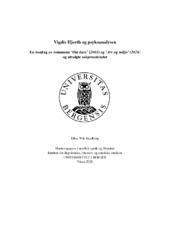| dc.contributor.author | Skadberg, Ellen Wik | |
| dc.date.accessioned | 2020-06-24T05:34:25Z | |
| dc.date.available | 2020-06-24T05:34:25Z | |
| dc.date.issued | 2020-06-20 | |
| dc.date.submitted | 2020-06-19T22:00:31Z | |
| dc.identifier.uri | https://hdl.handle.net/1956/22867 | |
| dc.description.abstract | Denne masteroppgaven er en studie av rollen som psykoanalysen har i Vigdis Hjorths forfatterskap. Fremgangsmåten består i en narratologisk lesning av to romaner, og en lesning av Hjorths egne kommentarer til psykoanalyse. Jeg tar utgangspunkt i romanene Om bare (2001) og Arv og miljø (2016), og intervju, paratekster og sakprosatekster av Hjorth. Det teoretiske rammeverket er Freuds teorier om det ubevisste. Analysefokuset i romanene er på plot og fortelleteknikk. Jeg argumenterer for at Hjorth lar psykoanalysen være en viktig del i konstruksjonen av plottet og i romankarakterenes tankegods. Oppgavens analyser finner i tillegg at Hjorth anvender psykoanalytisk metode på romanene ved at fortelleren plasserer seg i rollen som analysand, romanteksten er det bearbeidede elementet, mens leseren tildeles rollen som psykoanalytiker. I lesningen av Hjorths kommentarer til psykoanalyse viser jeg hvordan Hjorth tenker ut fra et psykoanalytisk perspektiv når hun skriver. Med teoretisk støtte i Freuds teorier om det ubevisste, argumenterer jeg for at Hjorth bruker psykoanalyse for egenterapi og ønske om økt selvinnsikt. Jeg finner i lesningene av romanene og Hjorths kommentarer at Hjorth legger opp til at leseren skal anvende psykoanalyse i lesningen av romanene. Effekter av at leseren innser dette er for det første at Hjorth blir sidestilt med romankarakterene, fordi hun anvender like beskrivelser i romanene som når hun omtaler sitt forhold til psykoanalyse. Flere vil dermed lese romanene som virkelighetslitteratur. En annen effekt er at leseren anvender psykoanalysen selv. Det kan skje ved å trø inn i rollen som psykoanalytiker, eller å bli analysand, hvor leseren reflekterer over sin tankegang. Det kan også være at leseren forsøker å analysere Hjorth eller romankarakterenes ubevisste. Denne oppgaven demonstrerer at psykoanalysen har en sentral rolle i Hjorths forfatterskap, fordi hun legger opp skrivingen, romanplottet og fortelleteknikken rundt det. | en_US |
| dc.description.abstract | This thesis is a study of the role on psychoanalysis in Vigdis Hjorth’s authorship. The methodology is a narratological reading of two novels, as well as a reading of Hjorth’s own commentary on psychoanalysis. The primary literature is the novels Om bare (2001) and Arv og miljø (2016), as well as interviews, paratexts, and non-fiction by Hjorth. The theoretical framework is Freud’s theories on the subconscious. In the thesis’s literary analyses of the novels, the focus lies on plot and narration. The analyses argue that Hjorth employs psychoanalysis as an important part of the construction of the plots and in view of the characters’ use of psychoanalysis to analyse themselves and others. In addition, the analyses claim that Hjorth uses a psychoanalytical method on the novels by placing the literary persona as the analysand, the text itself as the processed element, and the reader as the psychoanalyst. In the analysis of Hjorth’s commentary to psychoanalysis, I illustrate how Hjorth thinks from a psychoanalytical perspective in her writing. Based on Freud’s theories on the subconscious, I argue that Hjorth uses psychoanalysis for the purpose of self-therapy and self-awareness. I find in the analyses of the novels and the commentary, that Hjorth wishes the reader to apply psychoanalysis in their reading of the novels. If the reader realizes Hjorth’s ploy, the author herself becomes interchangeable with the characters in the novels, since she uses the same descriptions in the novels as when she comments on her own view of psychoanalysis. Consequently, readers will regard the novels as literary realism. Another effect is that the reader employs psychoanalysis themselves. This effect is expressed by either the reader stepping into the role as psychoanalyst or reflecting on their own thinking as an analysand. Furthermore, the reader might try to analyse Hjorth’s or the characters’ subconscious. This thesis demonstrates that psychoanalysis has a central role in Hjorth’s authorship, because it is fundamental in how she structures her writing, the plot of the novels and the narration of the novels. | en_US |
| dc.language.iso | nob | |
| dc.publisher | The University of Bergen | |
| dc.rights | Copyright the Author. All rights reserved | |
| dc.title | Vigdis Hjorth og psykoanalysen. En lesning av romanene ‘Om bare’ (2001) og ‘Arv og miljø’ (2016) og utvalgte sakprosatekster | |
| dc.title.alternative | Psychoanalysis in Vigdis Hjorth’s authorship. A reading of Om bare (2001) and Arv og miljø (2016), as well as a reding of Hjorth’s own commentary on psychoanalysis | |
| dc.type | Master thesis | |
| dc.date.updated | 2020-06-19T22:00:31Z | |
| dc.rights.holder | Copyright the Author. All rights reserved | |
| dc.description.degree | Mastergradsoppgave i nordisk språk og litteratur | |
| dc.description.localcode | MAHF-LÆNO | |
| dc.description.localcode | MAHF-NORD | |
| dc.description.localcode | NOLISP350 | |
| dc.subject.nus | 711123 | |
| fs.subjectcode | NOLISP350 | |
| fs.unitcode | 11-21-0 | |
